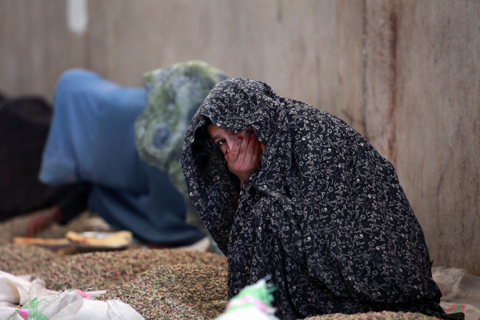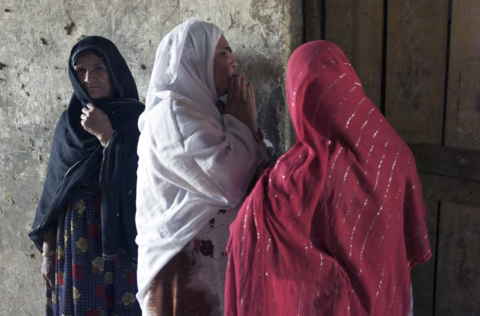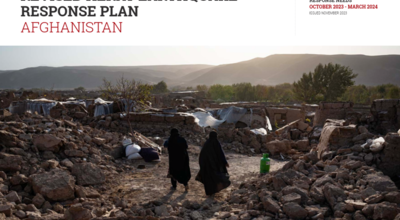UN expert report notes gains in Afghan women’s rights, expresses concern over future progress
KABUL - Concerns about women's rights in Afghanistan are growing and risk being ignored, according to a comprehensive recently-released report by the Committee on the Elimination of Discrimination against Women (CEDAW).
The report says that the rights and opportunities of Afghan women have grown considerably since the end of the Taliban regime in 2001, but expresses fear that these hard-won gains may be sacrificed following the departure of international forces from Afghanistan next year. Along with the UN, troop-contributing Western nations have been among the staunchest advocates of the rights of Afghan women.
As well as reviewing Afghanistan’s obligations under the Convention on the Elimination of All Forms of Discrimination against Women, the report considers ways to uphold the achievements achieved by Afghan women.
CEDAW, an expert body established in 1982, is composed of 23 independent experts on women's issues from around the world who gather periodically in Geneva to consider the status of women’s rights. Its mandate is very specific: it watches over the progress for women made in those countries that are the States parties to the Convention.
A country becomes a State party by ratifying or acceding to the Convention and thereby accepting a legal obligation to counteract discrimination against women, and the Committee monitors the implementation of national measures to fulfill this obligation.
The Convention is an international treaty adopted in 1979 by the UN General Assembly and which entered into force in 1981. Afghanistan signed the convention in 1980 but it was not until 2003 that Afghanistan acceded to the convention without any reservation.
The CEDAW report, released earlier in the week, represents something of a milestone – it is the first time that Afghanistan's obligations under the Convention have been evaluated.

The United Nations Assistance Mission in Afghanistan (UNAMA) has welcomed the report and considers its release a major step forward. UNAMA also welcomed the report’s findings, noting that they will help guide its technical support and assistance to the Afghan Government.
The report addresses concerns and offers recommendations in ten areas of women’s rights: 1) women’s participation in the peace process and public life; 2)upholding achievements; 3) legal complaint mechanisms; 4) national machinery for the advancement of women; 5) national human rights institutions; 6) violence against women and other harmful practices; 7) ‘moral crimes’ and so-called honour killings; 8) education; 9) health; 10) discriminatory family laws.
Some of the reports sharpest concerns deal with the fragile space for Afghan women in public life.
The report expressed uneasiness about the level of political participation of women in peace talks and noted that the voices of women in the peace process may be marginalized. As evidence, the report noted that only nine women belong to the 70-member High Peace Council, the Afghan body created in 2010 to broker peace with the Taliban. The report also noted that women have been excluded from major decision-making processes and expressed concern that their needs and interests may be compromised by deeply rooted patriarchal attitudes within the Government.
The report also expressed alarm at threats and targeted killings of women working for the Government and for female human rights advocates. It noted the low participation of women in the judiciary and the absence of female judges in the Supreme Court.
The Committee expressed concern that some members of the Afghan Parliament are attempting to repeal existing provisions in the Electoral Law which call for at least 25 per cent of seats in provincial councils to be reserved for women. The report showed alarm at attempts to weaken provisions for the protection of women in the law on the Elimination of Violence against Women (EVAW).

Many of these concerns are shared by UNAMA.
“Progress in implementing the EVAW law contributes to deterring harmful practices and protecting women from violence in their daily lives,” the Secretary-General’s Special Representative for Afghanistan and head of UNAMA, Jan Kubiš, said in a press statement in May.
The report noted with alarm the continuing high rate of violence against women, such as that carried out by anti-government forces opposed to the education of girls. Domestic and societal violence towards women also remains stubbornly high, and the report cited as unacceptable the numerous acts of domestic violence, rapes, stonings, and so-called honour crimes occurring in Afghanistan.
UNAMA is working with authorities to strengthen the implementation of EVAW law. It considers the enactment of the EVAW law a milestone for Afghanistan in terms of articulating the protection and promotion of women’s rights.
The UN Mission has noted challenges with the way the law is being implemented. In a report produced in December 2012, Still a Long Way to Go: Implementation of the Law on the Elimination of Violence against Women in Afghanistan, UNAMA found that although prosecutors and courts were increasingly applying the EVAW law in a growing number of reported incidents of violence against women, the overall use of the law remained low, indicating there is still much work to be done before women and girls in Afghanistan are fully protected from violence.
UNAMA continues to work with authorities to ensure that all State entities, including law enforcement officials and prosecuting authorities, are aware of their duties and responsibilities under the EVAW law.
In its concluding remarks the Committee referred to traditional practices which are harmful to women, such as child marriage, baad (the settlement of disputes by giving away girls), badal (exchange marriages), and forced marriages. It expressed concern at cases of self-immolation and running away from home as responses to harmful practices and violence against women. The Committee noted that despite concrete efforts to implement the EVAW law, incidents of violence against women remain under-reported.
UNAMA has consistently stated that harmful traditional practices represent a form of violence against women, causing suffering, humiliation and marginalization for millions of Afghan women. Most harmful practices have been criminalized under the EVAW law. The UN Mission has previously recommended that the Government take the lead in promoting a comprehensive interpretation of Sharia law that demonstrates how rights guaranteed in national and international law are consistent with and compliment the teachings of Islam.
 UN
UN







